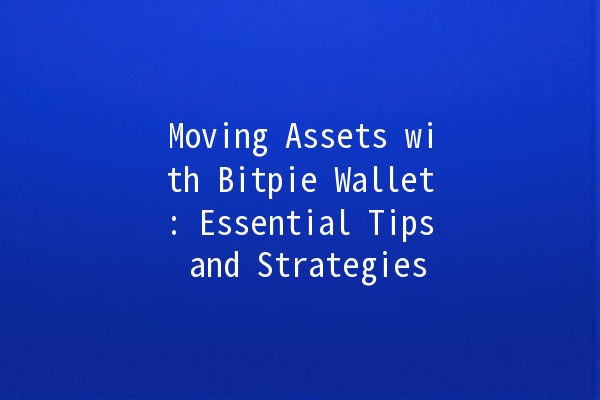
Using a cryptocurrency wallet efficiently is crucial, especially when migrating assets. This article delves into the process of asset migration using the Bitpie wallet, highlighting practical techniques and strategies to enhance your productivity while ensuring a smooth transfer of your digital assets.
Understanding Bitpie Wallet
Bitpie Wallet is a versatile and userfriendly cryptocurrency wallet that supports multiple cryptocurrencies. It is designed to provide a secure environment for managing digital assets with features such as multisignature support, decentralized storage, and a seamless user interface. Understanding how to use Bitpie to migrate assets effectively is essential for users looking to manage their digital currency portfolio.

The Importance of Asset Migration
Asset migration refers to moving your cryptocurrency from one wallet to another or between different blockchain networks. This process may become necessary due to various reasons, including:
Security: Upgrading to a more secure wallet or wanting to consolidate funds for better protection.
Access to Additional Features: Some wallets like Bitpie offer unique features that enhance the user experience or provide new investment opportunities.
Diversification: Moving assets to different wallets can aid in risk management and diversification of your portfolio.
ProductivityBoosting Techniques for Asset Migration
Before initiating asset migration, having a detailed plan in place is vital. Outline the steps you need to follow, including identifying which assets to move, selecting the best time for migration (market conditions), and informing any relevant parties if necessary.
Example Application:
Create a checklist of wallets involved in the migration, the assets to be transferred, and any associated fees.
Schedule the migration during lowtraffic times for the blockchain network to minimize transaction times and fees.
Security should be a top priority when migrating assets. Enabling 2FA adds an extra layer of security that can help protect your Bitpie wallet and other wallets involved in the migration process.
Example Application:
Before migration, check that 2FA is enabled on your Bitpie Wallet and all other wallets involved. This ensures that even if someone has your password, they cannot access your account without the second authentication factor.
Always keep your recovery phrases and private keys secure, yet accessible. These pieces of information are crucial for recovering your wallets if anything goes wrong during the migration process.
Example Application:
Write down your seed phrases and private keys on paper and store them in a safe place. Never store them digitally unless you use a secure and encrypted method.
When moving assets, ensuring that you are sending them to the correct wallet address is essential. Mistakes in the address can lead to irreversible loss of funds.
Example Application:
Before confirming a transaction, copy and paste the wallet address from your Bitpie wallet or use a QR code scanner. Avoid typing the address manually to reduce the chances of errors.
Keep a close eye on the transaction status after initiating the migration. Depending on network congestion, some transactions may take longer than expected. Understanding the fees associated with each transaction can help in planning your migration better.
Example Application:
Utilize blockchain explorers to track transaction statuses and be aware of fee fluctuations. If fees are high, consider waiting for a more favorable time to conduct your transactions.
Common Questions About Asset Migration with Bitpie Wallet
Bitpie Wallet supports a variety of cryptocurrencies, including Bitcoin, Ethereum, and many altcoins. You can easily check the supported assets on the official Bitpie site or within the app.
The time required for asset migration usually depends on the blockchain network congestion and the transaction fees chosen. Typically, transactions on networks like Ethereum can take anywhere from a few seconds to several minutes. Be sure to monitor the status for updates.
Yes, migrating assets often incurs transaction fees that depend on network conditions. It’s advisable to check the fee structure in the Bitpie app before initiating a transfer.
Yes, you can always transfer assets back to your Bitpie wallet from another wallet. Ensure that you have the correct wallet address, and follow the standard migration process as outlined.
If you realize you've made a mistake

